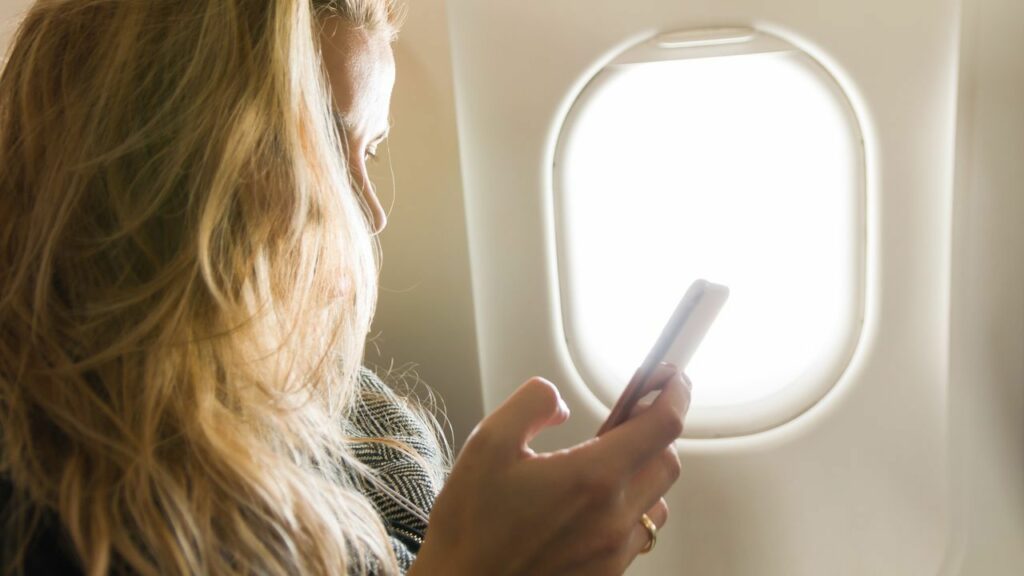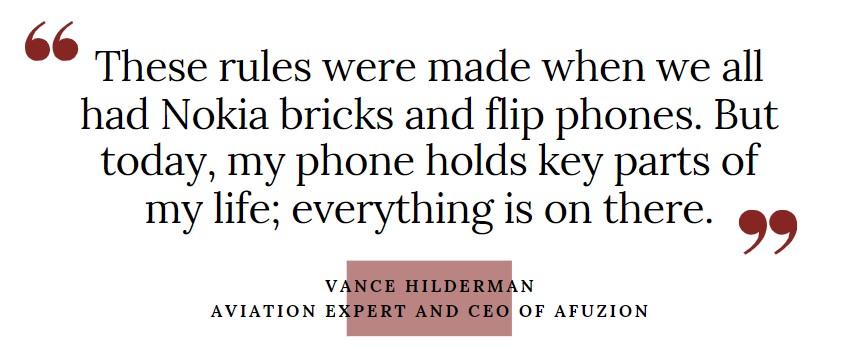The European Union's decision to allow travellers to use their smartphones on flights was welcomed with joy by many. But it has also raised some questions about the effect this may have on safety.
Passengers travelling inside the EU will soon be able to use their mobile devices fully on flights as the European Commission recently ruled that airlines have until 30 June 2023 to provide the necessary 5G technology.
"This ruling has been a long time coming, we have been waiting for this for 20 years," Vance Hilderman, aviation expert and CEO of airline consulting firm AFuzion, told The Brussels Times. "Some people had some concerns about safety, but all the systems on aircraft have shielding and special designs that ensure that no interference from onboard smartphones can happen."
The inability to predict the effects of onboard phones, as well as external 5G on planes initially led to its prohibition on flights as some people were concerned that phone data transmissions could disrupt aircraft navigation systems, and the accuracy of the plane’s automated control systems’ altitude readings might be affected.
Flip phones and Nokia bricks
This is not the case at all, according to Hilderman. The rule on putting phones in airplane mode was created because of the different flight phases: during take-off and climb, the aviation safety authorities want the passengers to pay attention to the safety briefing and listen to any announcements.
"But during the cruise phase when the plane is just flying, phone usage does not matter – there is nothing the passenger can do to disturb the frequencies," he said. "These rules were made when there were no smartphones, but we all had Nokia bricks and flip phones with very little technology. But today, my phone holds key parts of my life; everything is on there."
Still, the American and European situations are slightly different as 5G technology uses slightly different bands in the EU than it does in the US: in the US, the 5G band sits just a little higher than in Europe. This means it bumps up slightly closer to the band of the radio altimeter (which measures how far above the ground an airplane is travelling at any given time), especially important during bad weather landings.
Therefore, several American airlines have argued that 5G technology could interfere with altimeters and other sensitive equipment, while Europe's bigger gap between altimeter and 5G bands means altimeter filters would work better at blocking errant protruding 5G signals.
"When you have a foggy weather day in March and pilots cannot see anything when they are landing, it is possible in theory that the 5G technology of cell towers near airports could interfere with the frequencies in the US," Hilderman said. "But Europe works on different frequencies. This ruling will not affect safety at all."
In theory, that means that passengers on European flights should be able to use their smartphones on planes the same way they do while on the ground. "In practice, most aircraft do not (yet) have enough bandwidth for everybody to be watching an external video, for example. But that will change."
Related News
- Bye-bye airplane mode: EU allows smartphones during flights
- 'Iconic connection': Flights between Antwerp and London re-launches
- Ryanair confirms permanent closure of Brussels Airport base
This just leaves a different flight etiquette in different parts of the world, Hilderman argued. "In the US, everybody leans their seat back; in Europe, that's very rare. So some rules will be needed because nobody wants to be sitting 20 centimetres from somebody talking on the phone the entire flight."
"European airspace is very different from US airspace: in Europe, you are crossing a country every 30 minutes. There are many different cultures, but the Schengen area is generally still a more homogenous society – even though Italians and Swedes are not exactly the same."
While the American authorities are a little more reluctant to pass these kinds of restrictions, Hilderman expects the US to follow the EU's ruling within three years. "It has been widely examined everything and the conclusion was that if smartphones are not unsafe at gas stations, they are not unsafe anywhere. Unless, of course, your children are using them for nasty things."


